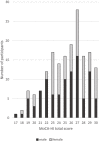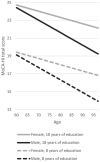Evaluation of the non-auditory neurocognitive test MoCA-HI for hearing-impaired
- PMID: 36582608
- PMCID: PMC9792785
- DOI: 10.3389/fneur.2022.1022292
Evaluation of the non-auditory neurocognitive test MoCA-HI for hearing-impaired
Abstract
Background: Since hearing loss and cognitive decline often co-occur among older adults, a cognitive screening test suitable for hearing-impaired people is of high clinical relevance. We report the first evaluation of a German language version of the Montreal Cognitive Assessment-Hearing Impaired version (MoCA-HI).
Objective: The aim of the present study was to compare cognitively healthy participants with and without hearing loss, to examine the impact of age, sex, educational level and degree of hearing impairment on the German MoCA-HI performance, and to develop normative data.
Material and methods: The German MoCA-HI was tested in 94 participants with normal or mild hearing impairment (group 1: 4PTA ≤ 40 dB on the better hearing ear) and 81 participants with moderate to profound hearing loss (group 2: 4PTA > 40 dB on the better hearing ear). Additionally, all participants performed the standard MoCA (version 8.2).
Results: No significant group difference between group 1 and 2 was found in the MoCA-HI total score (p = 0.05). In contrast, group 1 performed significantly better than group 2 on the standard MoCA (p < 0.001). There was no difference between the MoCA and the MoCA-HI performance in group 1 (p = 0.12), whereas individuals of group 2 performed significantly better on the MoCA-HI than on the standard MoCA (p < 0.001). Test-retest reliability of the MoCA-HI was high (p < 0.001). Higher age (p < 0.001), male sex (p = 0.009) and lower education (p < 0.001) were associated with a lower overall MoCA-HI score. Based on the demographic data normative data were developed by a regression-based approach.
Conclusion: The MoCA-HI is a cognitive screening test which is suitable for people with hearing impairment.
Keywords: MoCA; cognitive screening; dementia; hearing loss; test battery.
Copyright © 2022 Völter, Fricke, Götze, Labrenz, Tokic, Wirth, Nasreddine and Dawes.
Conflict of interest statement
CV has received reimbursement of scientific meeting participation fees and accommodation expenses, as well as honoraria for preparing continuing medical education events and funding for research projects that they initiated, from MED-EL. The remaining authors declare that the research was conducted in the absence of any commercial or financial relationships that could be construed as a potential conflict of interest.
Figures



Similar articles
-
Validation of the German Montreal-Cognitive-Assessment-H for hearing-impaired.Front Aging Neurosci. 2023 Jul 19;15:1209385. doi: 10.3389/fnagi.2023.1209385. eCollection 2023. Front Aging Neurosci. 2023. PMID: 37539344 Free PMC article.
-
Development of cognitive screening test for the severely hearing impaired: Hearing-impaired MoCA.Laryngoscope. 2017 May;127 Suppl 1:S4-S11. doi: 10.1002/lary.26590. Laryngoscope. 2017. PMID: 28409842
-
A Comparison of Montreal Cognitive Assessment Scores among Individuals with Normal Hearing and Cochlear Implants.Ear Hear. 2024 Jul-Aug 01;45(4):894-904. doi: 10.1097/AUD.0000000000001483. Epub 2024 Feb 9. Ear Hear. 2024. PMID: 38334699 Free PMC article.
-
The Screening Accuracy of a Visually Based Montreal Cognitive Assessment Tool for Older Adult Hearing Aid Users.Front Aging Neurosci. 2021 Aug 12;13:706282. doi: 10.3389/fnagi.2021.706282. eCollection 2021. Front Aging Neurosci. 2021. PMID: 34475818 Free PMC article.
-
Impact of Hearing Loss on Geriatric Assessment.Clin Interv Aging. 2020 Dec 30;15:2453-2467. doi: 10.2147/CIA.S281627. eCollection 2020. Clin Interv Aging. 2020. PMID: 33408469 Free PMC article. Review.
Cited by
-
Hearing loss and cognition: A protocol for ensuring speech understanding before neurocognitive assessment.Alzheimers Dement. 2024 Mar;20(3):1671-1681. doi: 10.1002/alz.13552. Epub 2023 Dec 11. Alzheimers Dement. 2024. PMID: 38081140 Free PMC article.
-
Do people with cognitive impairment benefit from cochlear implants? A scoping review.Eur Arch Otorhinolaryngol. 2024 Sep;281(9):4565-4573. doi: 10.1007/s00405-024-08719-5. Epub 2024 Jun 7. Eur Arch Otorhinolaryngol. 2024. PMID: 38847843 Free PMC article.
-
Barriers to Early Progress in Adult Cochlear Implant Outcomes.Ear Hear. 2025 Jan-Feb 01;46(1):98-110. doi: 10.1097/AUD.0000000000001559. Epub 2024 Aug 12. Ear Hear. 2025. PMID: 39129126 Free PMC article.
-
[Assessment of cognition: dementia and delirium : In consideration of the AWMF guidelines 038-013 and 084-002LG].Z Gerontol Geriatr. 2024 Oct;57(6):489-496. doi: 10.1007/s00391-024-02343-y. Epub 2024 Aug 27. Z Gerontol Geriatr. 2024. PMID: 39190208 German.
-
Validation of the German Montreal-Cognitive-Assessment-H for hearing-impaired.Front Aging Neurosci. 2023 Jul 19;15:1209385. doi: 10.3389/fnagi.2023.1209385. eCollection 2023. Front Aging Neurosci. 2023. PMID: 37539344 Free PMC article.
References
-
- WHO . Deafness and Hearing Loss. (2021). Available online at: https://www.who.int/news-room/fact-sheets/detail/deafness-and-hearing-loss (accessed August 16, 2022).
-
- WHO . Dementia. (2021). Available online at: https://www.who.int/news-room/fact-sheets/detail/dementia (accessed August 16, 2022).
LinkOut - more resources
Full Text Sources
Miscellaneous

